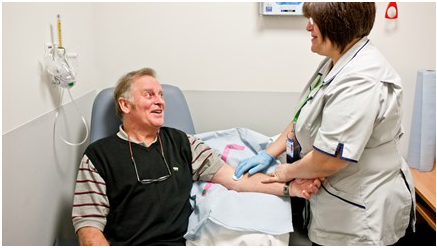
What is prostate ?
Only men have a prostate gland. The prostate is usually the size and shape of a walnut and grows bigger as you get older. It sits underneath the bladder and surrounds the urethra – the tube men urinate (pee) and ejaculate through.Its main job is to help make semen – the fluid that carries sperm.Prostate cancer can develop when cells in the prostate start to grow in an uncontrolled way. Prostate cancer often grows slowly to start with and may never cause any problems. But some men have prostate cancer that is more likely to spread. This needs treatment to stop it spreading outside the prostate.
Signs and symptoms
Prostate cancer that's contained inside the prostate (called localised prostate cancer or early prostate cancer) doesn't usually cause any symptoms. But some men might have some urinary problems. These can be mild and happen over many years and may be a sign of a benign prostate problem, rather than prostate cancer.
- needing to urinate more often than usual, including at night – for example if you often need to go again after two hours
- difficulty starting to urinate
- straining or taking a long time to finish urinating
- a weak flow when you urinate
- a feeling that you're not emptying your bladder fully
- needing to rush to the toilet – sometimes leaking before you get there
- dribbling urine after you finish.
For some men the first symptoms of prostate cancer might be new pain in the back, hips or pelvis. This can be caused by cancer that's spread to the bones (advanced prostate cancer). These symptoms are often caused by other problems such as general aches or arthritis. But it's still a good idea to get them checked out by your GP.
There are different treatments for prostate cancer. We've listed them all here. You may have a choice of treatments and this will depend on the stage of your cancer.
Active surveillance
Active surveillance is a way of monitoring slow-growing prostate cancer, rather than treating it straight away. The aim is to avoid unnecessary treatment, or delay treatment and the possible side effects.
Watchful waiting
Watchful waiting is a way of monitoring prostate cancer that isn't causing any symptoms or problems. The aim is to keep an eye on the cancer over the long term, and avoid treatment unless you get symptoms.
Information about having surgery to remove the prostate. Surgery may be a treatment option for men with localised prostate cancer.
External beam radiotherapy
External beam radiotherapy uses high energy X-ray beams to treat prostate cancer. This page is for men who are thinking of having this treatment to treat their prostate cancer.
Permanent seed brachytherapy
Permanent seed brachytherapy involves implanting tiny radioactive seeds into your prostate gland. This is also called low dose rate brachytherapy. Radiation from the seeds destroys cancer cells in the prostate. You may have this treatment on its own or together with external beam radiotherapy or hormone therapy.
Hormone therapy
Regular injections of certain drugs which block action of testosterone are very effective in preventing the growth of prostate cancer.
High dose-rate (HDR) brachytherapy
High dose-rate brachytherapy is also known as HDR brachytherapy, or temporary brachytherapy. It is a type of internal radiotherapy used to treat prostate cancer.
Chemotherapy

New treatments
Several new treatments for prostate cancer have recently been developed. This page describes some of these treatments and how they work.
Abiraterone
If you have advanced prostate cancer, abiraterone, a new type of hormone therapy can be very useful.
Radiotherapy for advanced prostate cancer
Radiotherapy can control the disease and pain to some extent.
Bisphosphonates
Bisphosphonates are drugs that can be used to treat men whose prostate cancer has spread to the bones and is no longer responding to hormone therapy. They do not treat the cancer itself but they can help to relieve bone pain. Bisphosphonates may also help to prevent and slow down the breakdown of bone.